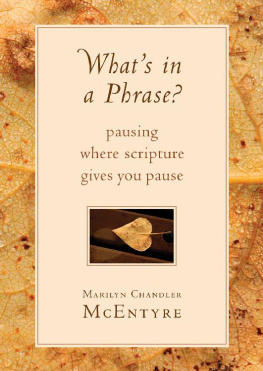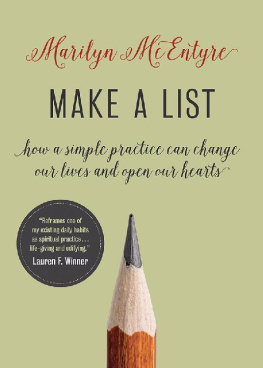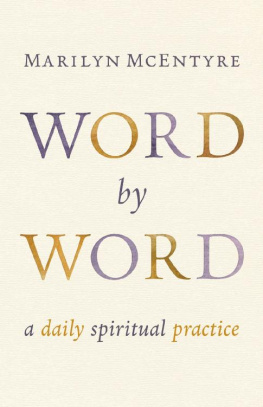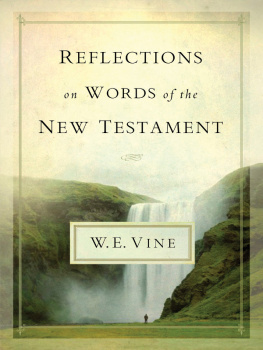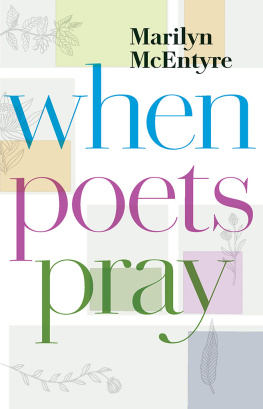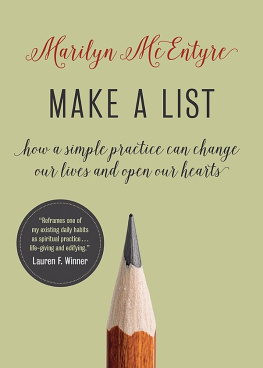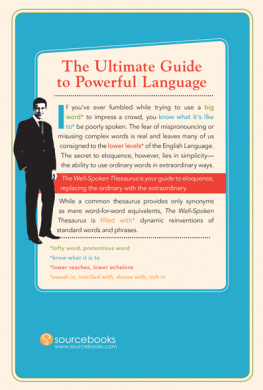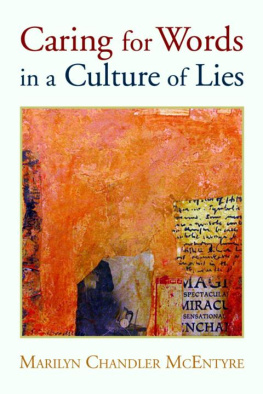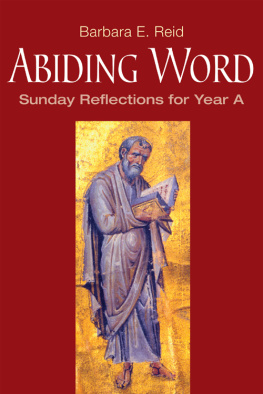Whats in
a Phrase?
Pausing Where Scripture Gives You Pause
Marilyn Chandler McEntyre
William B. Eerdmans Publishing Company
Grand Rapids, Michigan / Cambridge, U.K.
2014 Marilyn Chandler McEntyre
All rights reserved
Published 2014 by Wm. B. Eerdmans Publishing Co.
2140 Oak Industrial Drive n.e., Grand Rapids, Michigan 49505 /
P.O. Box 163, Cambridge cb3 9pu U.K.
www.eerdmans.com
Printed in the United States of America
20 19 18 17 16 15 14 7 6 5 4 3 2 1
Library of Congress Cataloging-in-Publication Data
isbn 978-0-8028-7114-5
eisbn 978-1-4674-4054-7 (ePub)
eisbn 978-1-4674-4012-7 (Kindle)
Scripture quotations are from The Holy Bible,
English Standard Version (ESV),
copyright 2001 by Crossway, a publishing ministry of
Good News Publishers. Used by permission. All rights reserved.
Contents
P hrases have lives of their own . Neither sentences nor single words, they are little compositions that suggest and evoke and invite. They dont, like the sentence, declare or ask or command. They are often what we remember: Fourscore and seven years ago recalls a whole era, triggers a constellation of feelings, and evokes an image of Lincoln. Inherit the earth carries the weight of promise, the rhythm of the Beatitudes, and a vision of Jesus on a hillside. We can hardly hear a mighty fortress without recalling the invigorating strains of the hymn and its dignified parade of images. In the classic film A Bridge Too Far, one soldier, rowing for his life away from an impending explosion, repeats again and again a fragment of the only prayer he remembers: Hail Mary, full of grace.... Hail Mary, full of grace.... Hail Mary, full of grace... and somehow we believe that such a prayer at such a time suffices. I have known people far into old age and dementia who can be awakened with a little shock of recognition by a familiar phrase; one aged English teacher applauded when she heard a line from Keatss The Eve of St. Agnes, and one of her neighbors, largely incoherent, recited the entire th Psalm when she heard a reader begin, Make a joyful noise...
Phrases are powerful instruments of awakening and recollection for all of us. The wisdom of the ancient Benedictine practice of lectio divina or holy reading lies in focusing not on an idea or even a sentence, but on a word or phrase that summons us to attention. Learning to notice what we notice as we move slowly from words to meaning, pausing where we sense a slight beckoning, allowing associations to emerge around the phrase that stopped us is an act of faith that the Spirit will meet us there. There is, we may assume, a gift to be received wherever we are stopped and summoned. At one reading of the prologue to Johns Gospel, it may be that In the beginning allows us a moment to step outside time and revel in a cosmic awe that brings with it the comfort that we are not stuck in the morass of human history, but belong to a much bigger story. At another reading of the same passage, it may be the simple phrase with God that gives us occasion to consider the mystery of divine companionship that is an aspect of Gods very being.
The reflections in this book are my small acts of obedience to such summonings. They are informed by the spirit of lectio divina, though they do not reflect the strictly prescribed devotional practice. I chose biblical phrases that have been stopping points for me, hoping that sharing what those phrases opened up might be of value to readers. I hope they will encourage you to find your favorite phrases and try the same exercise of sitting with them and seeing what they bring up. The writing of this book has served purposes for me beyond what I anticipated; I hope these meditations serve your purposes also, and that they may encourage you to see words within the Word as invitations, summoning you as you read to go in for a little while before you go on, and in doing so to find that the little phrases are places of divine encounter, epiphany, or unexpected guidance. I offer them with the prayer that they may add a few threads to the rich weave of conversation among people who share a belief that the living Word is a place of habitation where we are called to enter, actively to respond, sometimes to wrestle, and to dwell in trust as the Spirit teaches us what we need to know.

psalm :
O ne of the best listeners I have known was a woman who engaged in conversation so generously and with such eagerness that she seemed to listen with her whole body. She leaned in, and seemed to watch as well as listen to ones words as though they were rays of color beaming from a prism. I think of her when I hear the prayer Incline your ear, O L ord ...: Bend toward me. Stretch down to meet me in my smallness. Come into intimate space and attend to me. Let the mere whisper that seeps out of my weakness or shame reach you.
The petition is not, however, simply abject. Like so many of the psalmists prayers, it is grounded in the confidence that when we speak, God does listen that we can claim the audacity it takes to bring our most intimate concerns before the God of the Universe who does and will incline an ear and answer.
Perhaps we have heard these assurances before. The pertinent matter when we make this prayer is what Gods answer might look like. The answer to I want an answer may well be You have the answer. To pray honestly for an answer to our prayers is to be willing to recognize and heed the answers weve already been given in Scripture, in the shared wisdom of our spiritual community, in the examples of other peoples lives, in our own deepest intuitions, which are accessible only if we quiet ourselves enough to face our fears, suspend our evasive strategies, and own up to what we already know.
Often in prayer this clear assurance has come to me: You have what you need. You have the resources, the experience, the willing friends, the memories, the parables and stories that can equip you for this moment: call on them. Prayers are answered in other ways, of course, but this answer is worth particular consideration. It is an answer that wise parents often give children not I will come help you, but You know how to do this; try it.
It may be that what underlies most of our petitions, even the most helpless cries, is a prayer for courage to step out of abject need and trust that, with the help of the Spirit who is always present, we can meet our needs with intelligence and grace courage to leap out of the boat knowing Christ will meet us on the water.
Some who pray receive a clear directive: Go. Give. Rest. Let go. Forgive. Reframe. Most who pray with an open heart receive the comfort and reassurance that lie in prayer itself, which is the practice of the presence of God. But some receive their answer in a reminder of what God has already given. We dont know what were being prepared for. We often dont realize that what were doing is preparation. But it is often the case that the answer we pray for when God inclines an ear is the answer God was providing all along an answer that may be, Look and see what has already been unfolding. What wave is already cresting. What provision has already been made. If we lift our gaze beyond the anxieties, we may see that God has been listening.
Esther also was taken into the kings palace and
put in custody of Hegai, who had charge of the women.
esther :
Custody is an unsettling word, associated as it so often is with custody disputes in divorce cases or with crime suspects being taken into custody. Its more benevolent meaning is protective care or guardianship. It also means imprisonment. The two meanings often overlap: what passes for care can also be a kind of imprisonment, as it was for Esther, commanded to join the harem of King Ahasuerus, watched over by the kings eunuch, and chosen with no consultation of her wishes as queen of a people not her own. Hegai, the caregiver, was also in custody given a measure of power, but only on the kings terms. Conversely, imprisonment can be a condition of real care as one hopes is the case when people who are dangerously mentally ill are committed to a care facility for treatment.
Next page
